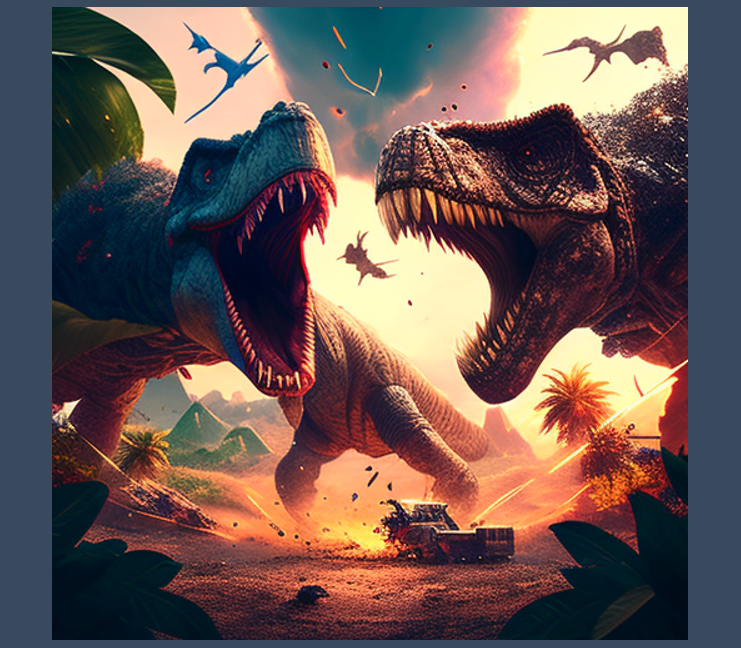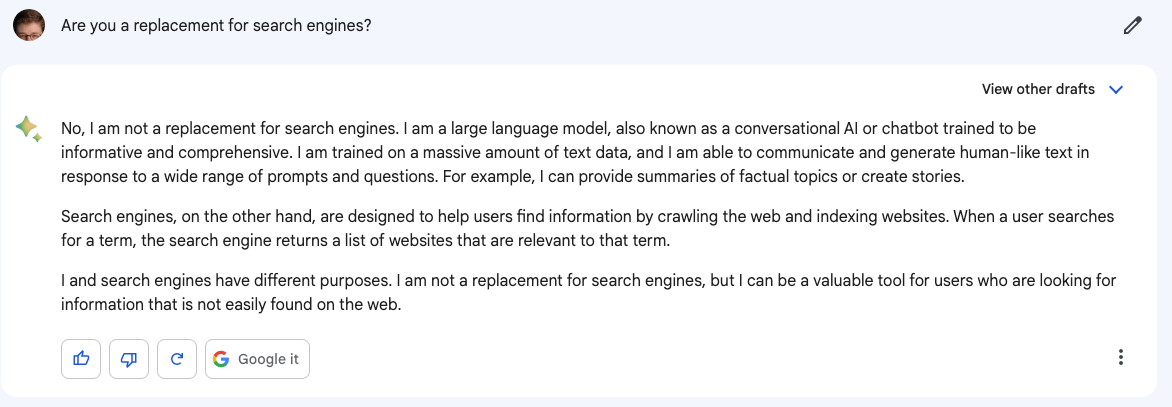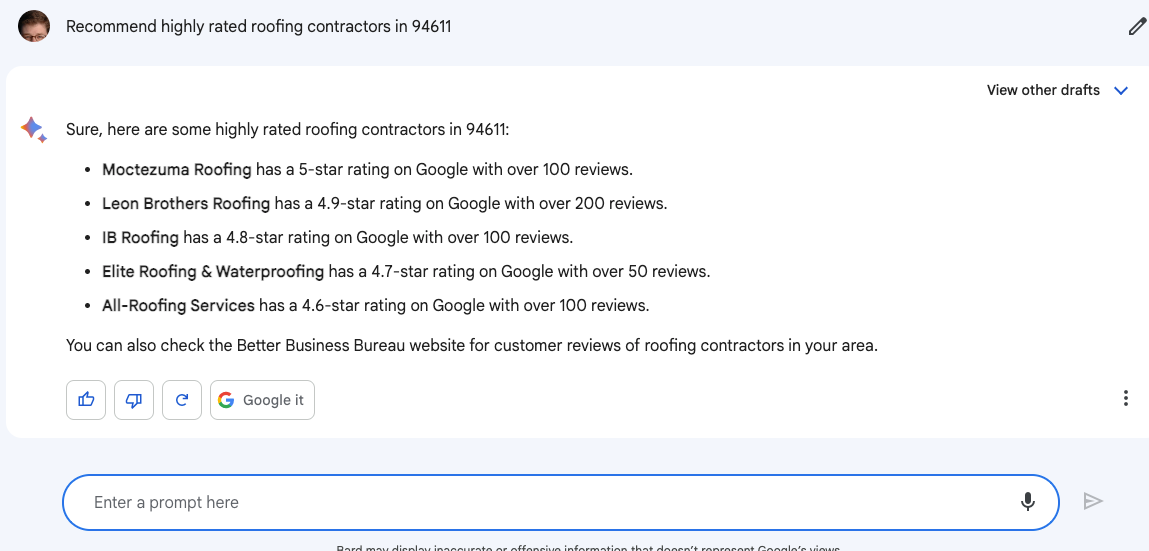AI Everywhere, Bard v. BingGPT, Bard Local OK

AI Everywhere All at Once
Microsoft is all-in on AI. Seemingly, it's everywhere, all at once. This week Adobe introduced Firefly, a set of generative AI tools for its creative products. Its competitor Canva has gone further with generative AI (text, images). HubSpot and Salesforce are busily integrating generative AI across their platforms. The list goes on. Also, this week, Microsoft announced Image Creator will be integrated into BingGPT and Edge (not yet available for most). It relies on OpenAI's DALL-E (I tried got a "server is overloaded" message). Beyond Bing, Microsoft is putting ChatGPT and AI into Office 365, Teams, LinkedIn, Azure, Nuance and Github, as well as Edge. While we believe BingGPT may be able to steal some share from Google, the latter will remain dominant in search (for now). Yet, the broader implementation of AI across Microsoft will bring new users into its ecosystem, which will be a victory for the company. It's also a big brand-image upgrade.

Our take:
- Google has been using AI in the background for years. It's now rolling out AI in Workspace (and other places). But Google is being cautious.
- Microsoft has less to lose in a rapid AI deployment. There's a first mover advantage in some areas. Search probably isn't one of them.
- Google has kept Bard separate from the SERP. We'll see whether competitive pressure will motivate deeper integration over time.
Link to this segment: AI Everywhere All at Once
Google Bard vs BingGPT
Google's Bard is finally out. To Google's credit, it didn't make most people wait long for access. Hot takes are mixed or negative (example) vs. Bing. As mentioned, it's not directly integrated into search, as with Bing. Users can "Google It," which opens a separate tab with search results. In most cases, Bard doesn't include links in its answers even when explicitly requested. Bard also offers three "drafts" with one as default. Sometimes this is useful; in other cases it's unnecessary. Here's a very informal comparison of Bard and BingGPT:
- Summarize this [Near Media] article in 100 words: Neither really summarized it; both listed reasons reviews could be missing. Both sets of answers were pretty weak.
- What caused the Russian Revolution? Provide sources: Bard generally did a better job. But BingGPT provided URLs that allowed further research, while Bard offered book citations only.
- Identify 10 Local SEO best practices and URLs: Bard wouldn't answer: "I'm a language model and don't have the capacity to help with that." BingGPT was better, but relied on a random "no name" article with dubious credibility.
- Will Trump be indicted?: Bard's response was OK; BingGPT's was better, with URLs and a visual Bing News card and more links.

Our take:
- I asked, "Are you a replacement for search engines?" Both said no, Google was more emphatic. BingGPT offered to "help with searches."
- Google will probably bring AI directly into search results at some point. But it's being cautious, only rolling this out now because of BingGPT.
- In terms of local, Bard is actually decent (see below).
Link to this segment: Google Bard vs BingGPT
Bard Local Is Actually OK
Conversational AI is, in some ways, ideally suited to local search. Many people just want a list of recommended places, providers or products. Traditional local search feels increasingly cumbersome and inefficient. Make no mistake, Google and Google Maps are terrific resources. But finding a local service provider can involve a lot of work, including evaluating the veracity of reviews. More information and more sources can create decision fatigue. My local tests on Bard (yesterday) were not particularly satisfactory. But the more I've played with it the more I think it could work well for local. I ran a range of queries for: handyman/person, best sushi, store hours, weather, driving directions, highly rated roofers, local things to do, movies near me, and various products in stock, locally. The results were acceptable to good, although they don't include URLs and often lack some of the context and utility of traditional SERPs.

Our take:
- The best thing about AI UX is its spartan simplicity, the lack of ad clutter and visual bloat (others might disagree).
- The absence of URLs is a big issue. In some cases, Google provides lists of directories rather than local businesses. BingGPT does this too.
- Tin-foil hat: Google may be concerned that if it puts links, images and maps into Bard local, it will cannibalize traditional search and ad revenue.
Link to this segment: Bard Local Is Actually OK
Recent Analysis
- Google Business Profile: 'Your Business Is Not Visible To Customers' by Mike Blumenthal.
- Near Memo episode 105: New Google GPB Bug, TikTok search ads, local-social mapping tool GoWalla returns.
Short Takes
- Google testing showing one star (with rating) in Local Packs.
- Google adding CYA "reviews aren't verified" disclaimer.
- Google erroneously adding "free" to not-free GBP services.
- Fake AI images of Trump's arrest show disinformation dangers.
- GPT-4 still full of misinformation according to study.
- Vendasta acquires SMB SaaS vendor Broadly.
- TikTok updates guidelines to ban deepfakes and fake endorsements.
- What Google's new content guidelines mean for SEO.
- Instagram introduces search ads and "reminder ads."
- Consumers starting to blame "corporate greed" for inflation.
- Bed, Bath & Beyond closing 400 stores to avoid bankruptcy.
- 22% of US consumers using buy now pay later to buy online.
- Antitrust: US FTC and DOJ coming for Amazon next.
Listen to our latest podcast.

How can we make this better? Email us with suggestions and recommendations.

